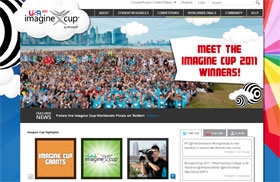Microsoft’s Imagine Cup 2011 Winners
 The company also unveiled plans to launch a three-year, $3 million competitive grant programme to help recipients realise their vision of solving the world’s toughest problems.
The company also unveiled plans to launch a three-year, $3 million competitive grant programme to help recipients realise their vision of solving the world’s toughest problems.
Creators of winning student projects hail from Bangladesh, Brazil, Denmark, France, Greece, Ireland, Korea, Poland, Romania and Taiwan.
“The innovators, entrepreneurs and humanitarians who compete in the Imagine Cup have developed an inspiring spectrum of projects, raising the bar higher and higher each year,” said S. Somasegar, senior vice president, Developer Division, Microsoft.
Imagine Cup teams will be eligible to apply for grants that include a combination of cash, software, training, consulting and other support. Microsoft will announce details about the grant program and application process later this summer.
The Imagine Cup 2011 competition winners were announced tonight at the Imagine Cup World Festival and Awards Ceremony at the David H. Koch Theater at Lincoln Center in New York. Narrowed from more than 350,000 global registrants, more than 400 students from 70 countries traveled to New York to compete at the Worldwide Finals.
Team Hermes from Ireland took home top honors in the Software Design competition. The team designed a device that plugs into a car and monitors dangerous driving behavior and road conditions, providing instant feedback to both the driver and the car owner.
The team’s solution uses embedded technology, Windows Phone 7, Bing Maps and the Windows Azure cloud computing platform to change driving habits and reduce road deaths, which impact a significant number of young lives each year. With its victory, the team won $25,000.
Student projects are frequently inspired by United Nations Millennium Development Goals, and participants seek to solve the world’s toughest problems through technology.
As such, this year teams focused heavily on environmental concerns, with 24 per cent of worldwide finalist projects and 60 per cent of all game design projects shedding light on environmental issues. Taking a cue from recent world events, natural disaster relief was another common theme: 23 per cent of projects addressed varying aspects of disaster relief.
What the stars mean:
★ Poor ★ ★ Promising ★★★ Good ★★★★ Very good ★★★★★ Exceptional
Latest News
More News
- State corporations poised to drive 2026 growth (February 03, 2026 | 13:58)
- Why high-tech talent will define Vietnam’s growth (February 02, 2026 | 10:47)
- FMCG resilience amid varying storms (February 02, 2026 | 10:00)
- Customs reforms strengthen business confidence, support trade growth (February 01, 2026 | 08:20)
- Vietnam and US to launch sixth trade negotiation round (January 30, 2026 | 15:19)
- Digital publishing emerges as key growth driver in Vietnam (January 30, 2026 | 10:59)
- EVN signs key contract for Tri An hydropower expansion (January 30, 2026 | 10:57)
- Vietnam to lead trade growth in ASEAN (January 29, 2026 | 15:08)
- Carlsberg Vietnam delivers Lunar New Year support in central region (January 28, 2026 | 17:19)
- TikTok penalised $35,000 in Vietnam for consumer protection violations (January 28, 2026 | 17:15)
















 Mobile Version
Mobile Version